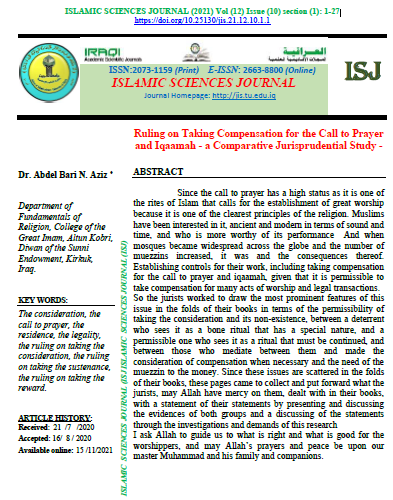Ruling on Taking Compensation for the Call to Prayer and Iqaamah - a Comparative Jurisprudential Study -
Main Article Content
Abstract
ABSTRACT
Since the call to prayer has a high status as it is one of the rites of Islam that calls for the establishment of great worship because it is one of the clearest principles of the religion. Muslims have been interested in it, ancient and modern in terms of sound and time, and who is more worthy of its performance And when mosques became widespread across the globe and the number of muezzins increased, it was and the consequences thereof. Establishing controls for their work, including taking compensation for the call to prayer and iqaamah, given that it is permissible to take compensation for many acts of worship and legal transactions.
So the jurists worked to draw the most prominent features of this issue in the folds of their books in terms of the permissibility of taking the consideration and its non-existence, between a deterrent who sees it as a bone ritual that has a special nature, and a permissible one who sees it as a ritual that must be continued, and between those who mediate between them and made the consideration of compensation when necessary and the need of the muezzin to the money. Since these issues are scattered in the folds of their books, these pages came to collect and put forward what the jurists, may Allah have mercy on them, dealt with in their books, with a statement of their statements by presenting and discussing the evidences of both groups and a discussing of the statements through the investigations and demands of this research
I ask Allah to guide us to what is right and what is good for the worshippers, and may Allah’s prayers and peace be upon our master Muhammad and his family and companions.
Article Details

This work is licensed under a Creative Commons Attribution 4.0 International License.
COLLEGE OF ISLAMIC SCIENCES, TIKRIT UNIVERSITY. THIS IS AN OPEN ACCESS ARTICLE UNDER THE CC BY LICENSE http://creativecommons.org/licenses/by/4.0/

